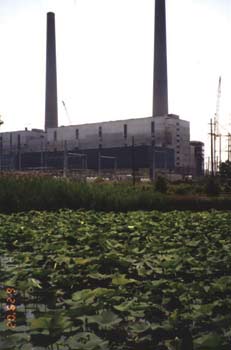
The DTE Energy Monroe Power Plant. Photo: Environmental Protection Agency.
The Court of Appeals has upheld state permits for DTE Energy Co.’s modifications of its coal-fired power plant on the Lake Erie shore in Monroe, despite objections by a major environmental group.
In a unanimous opinion, the court rejected the Sierra Club’s challenge to permits issued by the Department of Environmental Quality (DEQ) in 2010 and 2012.
The work has been underway during the Sierra Club’s appeal of a lower court decision in favor of the utility, said Randi Berris, a DTE senior media relations specialist.
It’s part of a 10-year, $2 billion overhaul of the state’s largest power plant, she said. It was built in the 1970s.
According to the court decision, the modifications are intended to improve fuel use and reduce three types of emissions: nitrogen oxides by 75 percent, particulates by 55 percent and sulfur dioxide by 90 percent. Particulates are minute particles emitted from smokestacks.
Berris said the company is installing the “most advanced environmental control systems available” that will make the Monroe plant “among the cleanest coal-fired generating units in the country.”
 The suit claimed that the modifications don’t comply with the federal Clean Air Act and that DEQ didn’t properly analyze the power plant’s particulate emissions, thus jeopardizing the health of residents in Southeast Michigan.
The suit claimed that the modifications don’t comply with the federal Clean Air Act and that DEQ didn’t properly analyze the power plant’s particulate emissions, thus jeopardizing the health of residents in Southeast Michigan.
But the three-judge appeals court disagreed, saying that DEQ’s “approval of the permits is consistent with the purpose of the Clean Air Act, which is to reduce pollutants.” The modifications, it continued, “will improve the condition of the air.”
The Sierra Club hoped for a court order requiring DEQ to change some of the conditions of the permits.
“The permit as written was a good thing,” said an attorney for the organization, Nick Schroeck of the Great Lakes Environmental Law Center in Detroit.
But DEQ “could have done better and should have done better under the law,” Schroeck said. He also said DEQ should evaluate air emissions hourly rather than averaging them over 24 hours.
The Sierra Club is “evaluating our options” concerning a possible further appeal, he said.
Earlier this year, the Sierra Club filed a separate federal court suit in Detroit accusing DTE of Clean Air Act violations from the utility’s Belle River, River Rouge, St. Clair and Trenton Channel coal-fired plants.
That case is still pending.